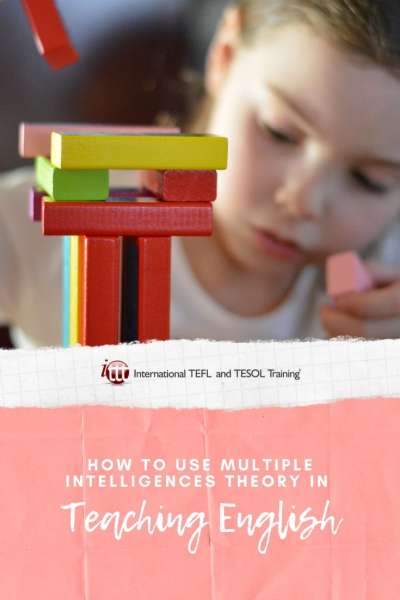How to Use Multiple Intelligences Theory in Teaching English

We used to think a good student is a student who can get a higher score on math, reading, and writing. Till now, this point of view is out of date already. The multiple intelligences theory proposed by Howard Gardner in 1983 has revolutionized how we define intelligence nowadays.
This post was written by our TEFL certification graduate Xiaoyu Z. Please note that this blog post might not necessarily represent the beliefs or opinions of ITTT.
The Theory
In the theory, Howard Gardner suggested every individual has the potential to balanced develop eight separate bits of intelligence together. The eight bits of intelligence is, linguistic, musical, logical-mathematical, spatial, bodily-kinesthetic, interpersonal, intrapersonal and naturalistic. Every person possesses all the intelligence, but with imbalanced development. Some intelligence is dominant, some are not. With proper ways of teaching and learning, a student can have improved performance.
On account of improving the teaching quality, what is learned by many educators now is how the multiple intelligences theory can be used in teaching.

Also Read: Where do schools provide free housing for English teachers abroad?
Change the view of students
In the theory of multiple intelligences, almost everyone is intelligent, only the categories and nature of intelligence show differentiation. The difference of students should not be a burden on education, but rather a valuable resource. We need to change the previous view of students, look at students with appreciation and discovery, knowing that every student is a genius, as long as we guide them correctly. Every student can become a talent.
Redefine teaching
In terms of teaching methods, the theory of multiple intelligences emphasizes that the most suitable method to teach students should be differentiated instruction and assessment. We should pay attention to the differences between students and allow students to demonstrate their understanding of the subject matters. In teaching, teachers should use diversified teaching modes to promote the development of students' potential and promote each student to become an excellent one at last.

Also Read: Do I need a TEFL certificate to teach abroad?
Change the teaching objectives
As to teaching objectives, multiple intelligences do not advocate cultivating all people to be all-rounders but should determine the most suitable development path for each student. The objectives of teaching also should be concentrating on finding the students’ advantages, giving them more opportunities and achieve one’s value. The value of education lies not only in cultivating useful talents to our society but also in developing and liberating people themselves.
Change the teaching behavior
Teachers can no longer prepare lessons and attend classes just to complete the requirements of the teaching syllabus as before. Instead, they should pay more attention to students, developing students’ potential and try to let them thinking thoroughly. Teachers should adopt a variety of ways and means to present the teaching strategy of "multiple intelligences", realize the purpose of "multiple intelligences and teaching", and improve the teaching form. While teaching, group cooperation, and discussion are emphasized to cultivate interpersonal intelligence.
Are You Ready to Teach English as a Foreign Language?
A one-size-fits-all approach to education will invariably leave some students behind. The multiple intelligences theory gives us deep thinking about teaching. Our students depend on teachers, a teacher has to rethink the ways of teaching and try to perfect the teaching itself can give the students a chance to release their talent. Think more, learn more and done more before teaching, while teaching and after teaching can make a teacher better one.
Apply now & get certified to teach english abroad!
Speak with an ITTT advisor today to put together your personal plan for teaching English abroad.
Send us an email or call us toll-free at 1-800-490-0531 to speak with an ITTT advisor today.
Related Articles:
- Online or In-Class - Which TEFL Course Should You Take?
- The Truth About TEFL for Non-Native English Speaking Teachers
- How to Save Money While Teaching English Abroad?
- Two Traveling Teachers Share What It's Like Teaching English Abroad as a Couple
- The 12 Most Affordable Countries For Teaching English Abroad
- The Best Countries to Teach ESL When You're 50+




